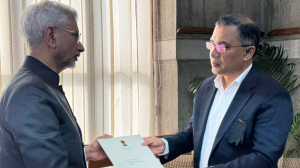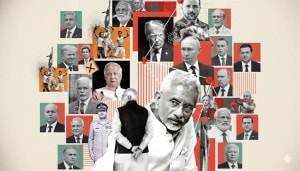The chase for power
Aspirants for a cabinet berth in the Manmohan Singh Government are growing by the day and are not limited only to the Congress party. Minist...

Aspirants for a cabinet berth in the Manmohan Singh Government are growing by the day and are not limited only to the Congress party. Minister of State for Company Affairs and Laloo Prasad Yadav confidant Prem Gupta is tired of his current assignment and is lobbying hard for the Power Ministry. Gupta, worried that the PM would reshuffle the Cabinet before January 14, went around telling senior Congress leaders that the present time was inauspicious for such activities. His mentor too is pressing for an additional cabinet berth for the RJD, in the manner of the DMK. Word is that Laloo may even get a senior independent politician elected to the Rajya Sabha on an RJD ticket so that he can be accommodated in the Manmohan government. But Gupta has his eyes on the Power Ministry and is even letting it be known that he is willing to settle for Minister of State Independent Charge status.
Foreign body
After the royal coup of February 1, 2005 in Nepal, New Delhi8217;s relationship with that country is yet to stabilise. India insists that Nepal must return to parliamentary democracy. But given the relationship between the two nations, dialogues take place at many levels and mostly confusion is the result. Last month, a Nepalese cabinet minister told an Indian diplomat in Kathmandu that his masters in South Block were in the dark about the initiatives to improve relations. The minister said that a visitor from India had come on a secret visit to Kathmandu and sorted out the bilateral issues with King Gyanendra. The entire South Block went into a tizzy to find out who the mysterious plenipotentiary was. Suspecting National Security Advisor M K Narayanan of having been sent by the Prime Minister to talk to the King, a senior Foreign Ministry bureaucrat asked him point blank whether he was involved. After a due diligence, it was found out that the mysterious visitor was a journalist with delusion of grandeur. He had met the King and apparently promised that he would bring bilateral relations on track. This man had also unsuccessfully tried to get the then Prime Minister Atal Behari Vajpayee and Pakistan President Pervez Musharraf to meet on the sidelines of the SAARC summit in Nepal in 2001. Some people, it seems, never learn.
Revival panel in coma
The Board for Reconstruction of Public Sector Enterprises was to be the nodal authority to advise the government on reviving state-run enterprises. But now it has been sidelined by a Committee of Secretaries constituted at the intervention of the Cabinet Secretariat. The reasoning was that of the 20-odd cases approved by BRPSE, only three got Cabinet approval. The BRPSE, on the other hand, had been asking for 8216;8216;fast track approval system8217;8217; as there was considerable delay by the administrative ministries in seeking Cabinet approvals. What is unusual is that the BRPSE chairman, holding the rank of a minister of state, is now answerable to the CoS headed by bureaucrats. And the board8217;s decisions are required to have the support of the CoS before they can be forwarded to the Cabinet.
Price of control
Mani Shankar Aiyar is unhappy over the navratna autonomy accorded to Oil 038; Natural Gas Corp. When he brought up the issue at the Energy Coordination Committee meeting on December 16, Finance Minister P Chidambaram could not resist a dig. He suggested that the government buy back the ONGC shares floating in the market and with employees to become a 100-percent owner of the national oil company. Aiyar was keen but his jaw dropped when he was informed that the government would have to dole out a whopping Rs 40,000 crore to buy back the 26 percent equity floating outside the government. It seems ONGC has avoided 8216;8216;nationalisation8217;8217; for the time being.
Rough rider
Some cabinet ministers are known for their suavity, often reflected in the way they conduct themselves at public functions. And then there are those like T R Baalu, the Union minister for shipping, road transport and ports. Last Friday, bureaucrats and scribes were taken aback when Baalu repeatedly cut short his officials who were making presentations on what the ministry was doing in its various sectors. A presentation by Joint Secretary Ports A K Bhalla was interrupted by a loud thud. Many thought it was some object falling. It turned out that Baalu had smacked his mike to warn Bhalla and to send a signal to him to sit down. Bhalla ended his presentation and slumped back in his seat. When asked to explain the minister8217;s rude demeanour, a senior bureaucrat tried to play it down. 8216;8216;We have got used to it,8217;8217; he said.
Age conscious
The Akali Dal is in the thick of poll preparations but amidst this din, Prakash Singh Badal found time to launch his dream project: an old age home. According to one of Badal8217;s family friend, the party supremo was so moved by the plight of the aged Punjabis waiting endlessly for their NRI children that he decided to convert an ancestral property in native Badal village into a well-equipped home for the aged. This is the first such home in the state where the society is yet to catch up with the trend of nuclear families. Even though elections are a no-holds-barred affair, Badal does not want to politicise his philanthrophy against Congress8217; Amarinder Singh as the issue is very close to his heart.
Penalty clause
Gajendra Haldea of the Planning Commission is a dreaded man for those trying to push the modernisation plan for Delhi and Mumbai airports. His dissent note triggered the controversy over the technical evaluation of bids that had resulted in only two bidders qualifying at that stage. What is not known by many is that Haldea was behind the clause on a penalty to be imposed on the foreign collaborator in case a consortium was not able to meet the standards set by the government. This essentially meant the foreign collaborator had to give a guarantee of 80 million, a prerequisite in tender documents.
When the bid documents were being discussed, there was not much support for the clause as many within the Civil Aviation Ministry felt it was a restrictive measure. But Haldea was keen to make the foreign partner more accountable. The result was that Changi, which along with Bharti was a keen contender and one of the first consortia to get its act together, opted out of the process. Hochtief followed for similar reasons. Had Changi and Hochtief been in the race, the scenario of just two bidders making it to the finals might have been different8230;If only Haldea not insisted on tightening controls.
Tailpiece
Indian diplomats are on tenterhooks as Lok Sabha Speaker Somnath Chatterjee along with Rajya Sabha chairman Bhairon Singh Shekhawat leave for Nairobi for the Commonwealth Presiding Officers Conference on January 2. Chatterjee has a reputation for running into trouble in foreign lands.
- 01
- 02
- 03
- 04
- 05































